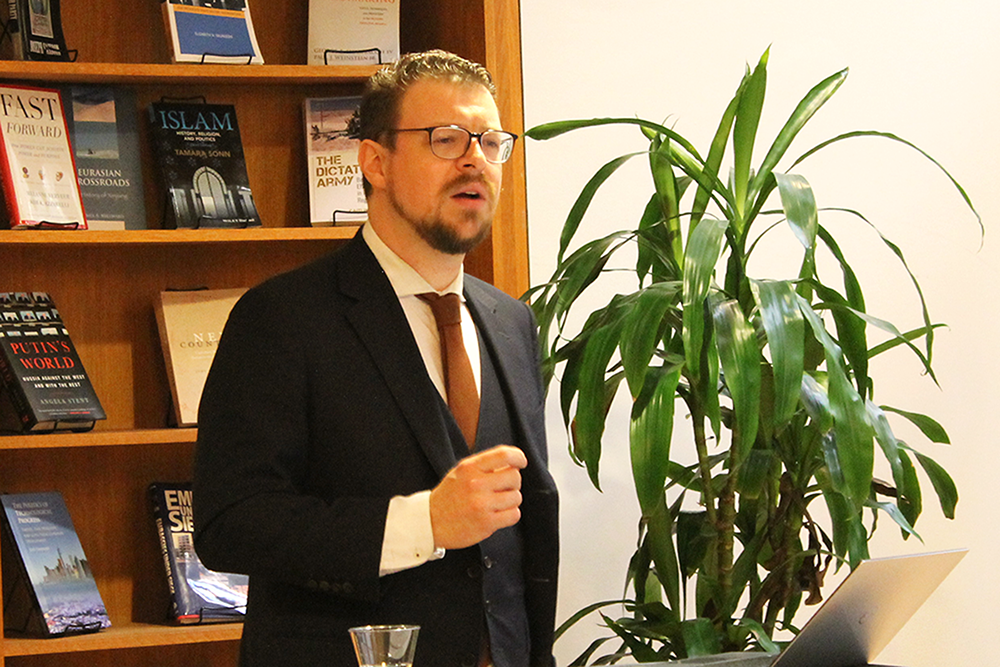The U.S. and Australian governments must reassess and adjust their alliance to accommodate changes in the global political sphere, Australian National University senior lecturer Andrew Carr said at an event Thursday.
As the U.S. and Australian alliance approaches its 70th anniversary in 2021, Carr explained that the two nations must reassess their strategic interests and acknowledge their differences. Although an alliance between the U.S. and Australia remains popular, it may become invisible if politicians do not account for the countries’ diverging policies, Carr said at the Feb. 6 event titled “The Ally’s Burden — What does Australia owe America in 2020 and beyond?”
The alliance was signed in 1951 with a mutual understanding that Australia would offer the U.S. trade, public political support and private intelligence sharing. In return, the U.S. would provide security to protect the Australian continent, Carr said. The terms of the current alliance, however, are outdated in today’s international political climate.

“America needs more than just a small but loyal friend. As Australia faces its own economic decline, its political weight and economic influence is waning,” Carr said. “Australia cannot just rely on an unspoken promise of security anymore. The alarm bells are ringing, and we need to think about not just worst-case scenarios but a handful of quite plausible conflicts in our near neighborhood.”
The United States and Australia have evolved politically since the the start of their alliance, leading to diverging strategic interests around the world, according to Carr. In 2020, the two countries have varying policies and perspectives around U.S. power in Asia, infrastructure developments in China, defending Taiwan and the role of Australian troops around the globe, Carr said.
Many politicians and journalists have falsely argued that the nations’ diverging interests have been caused by U.S. President Donald Trump’s diplomatic approach or Chinese interference in Australia, according to Carr.
“These differences are due to underlying strategic differences and strategic interests and not due, as sometimes claimed, to the bombastic style of President Trump, nor as evidence of Chinese coercion, bribery and other influence campaigns by the CCP,” Carr said.
A 2019 poll showed that 72% of Australian citizens consider their country’s alliance with the U.S. very important or fairly important for Australian security, according to the Lowy Institute, which conducts an annual poll of Australian attitudes toward the United States. For the alliance to remain viable in the future, however, the nations must consider a new arrangement, according to Carr.
“If we are to remain mates, a new approach to our relationship is going to have to face up to what I see as a diverging series of strategic interests,” Carr said. “It will have to take a form that meets these challenges and differences and offers greater value to both parties.”
Carr works in the Strategic and Defence Studies Centre at Australian National University. He is an expert in strategy, time, middle powers and Australian defense policy and has published books with Oxford University Press and Georgetown University Press, as well as numerous academic journal articles on the subject. Carr spoke at the discussion, hosted by the Walsh School of Foreign Service in the McGhee Library in the Intercultural Center on Feb. 6.
At the event, Carr said political actors from the United States and Australia must reconsider their shared strategic missions and the value of their continued alliance so that the nations can productively pursue their goals.
“At times of uncertainty such as this moment, I believe that questions of presence must give way to deeper questions of purpose,” Carr said. “Only if we have clear ideas about what both of our nations seek and how we want to achieve those goals can the questions of material cooperation and material allocation make sense.”
Although the United States has aided Australia militarily and politically in many instances throughout the nation’s history, Australia needs to reprioritize its own strategic interests, according to Carr.
“What does Australia owe the United States in 2020? The answer remains a great deal,” Carr said. “I do not expect America acts purely in self-sacrifice, and I do not believe we can be asked to do so likewise. Our mateship, if it is to endure, needs to be based on a firm understanding of our underlying strategic interests. As these are evolving, so must the nature of our relationship.”
Hoya Staff Writer Amy Li contributed reporting.




















